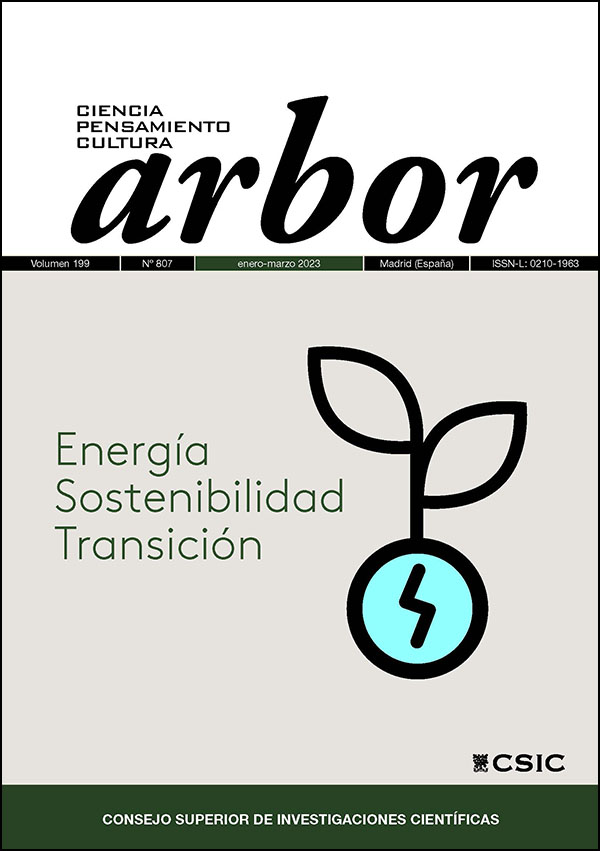Diferencias estratégicas de las majors del petróleo ante la transición energética: opciones, motivaciones e implicaciones
DOI:
https://doi.org/10.3989/arbor.2023.807005Palabras clave:
petróleo, majors, cambio climático, EuropaResumen
El trabajo propone un marco para analizar las opciones estratégicas de las majors del petróleo ante el reto de la transición energética, considerando simultáneamente dos cuestiones que están interrelacionadas: el objetivo de reducir las emisiones de gases de efecto invernadero y el objetivo de adaptarse a los cambios que se están produciendo en la demanda de energía. Haciendo uso de este marco, se pregunta en qué medida los cambios que se están produciendo en la demanda energética han sido una condición necesaria, o incluso suficiente, para que las compañías europeas hayan iniciado estrategias de diversificación. Igualmente se pregunta si la diversificación del negocio hacia otras actividades no vinculadas a los hidrocarburos ha sido condición necesaria, o incluso suficiente, para que estas empresas hayan empezado a asumir la reducción de emisiones como un objetivo estratégico. Por último, el trabajo analiza el impacto de esas estrategias de diversificación sobre el desarrollo de las energías renovables.
Descargas
Citas
Bach, Matthew (2019). The oil and gas sector: from climate laggard to climate leader. Environmental Politics, 28:87-103. https://doi.org/10.1080/09644016.2019.1521911
Carbon Tracker Initiative (2022). Absolute Impact. Why Oil and Gas Companies Need Credible Plans to Meet Climate Targets. Carbon Tracker: Absolute Impact: Why Oil and Gas Companies Need Credible Plans to Meet Climate Targets - Carbon Tracker Initiative.
Christophers, Brett (2021). Fossilised Capital: Price and Profit in the Energy Transition. New Political Economy, 27:146-59. https://doi.org/10.1080/13563467.2021.1926957
Dietz, Simon; Gardiner, Dan; Jahn, Valentin y Noels, Joelien (2021). How ambitious are oil and gas companies' climate goals. Science, 374:405-8. https://doi.org/10.1126/science.abh0687 PMid:34672760
Du, Shuili y Vieria, Edward (2012). Striving for legitimacy through corporate social responsibility: insights from oil companies, Journal Business of Ethics, 110 (4). https://doi.org/10.1007/s10551-012-1490-4
Fattouh Bassam; Poudineh Ramatalah; West Rob (2019). The rise of renewables and energy transition: what adaptation strategy exists for oil companies and oil-exporting countries. Energy Transition, 3:45-58. https://doi.org/10.1007/s41825-019-00013-x
Grant, Andrew y Coffin, Mike (2020). How diverging oil and gas company strategies link to stranded asset risk, Carbon Tracker: https://carbontracker.org/reports/fault-lines/.
Grasso, Marco (2019). Oily politics: A critical assessment of the oil and gas industry's contribution to climate change. Energy Research & Social Science, 50:106-15. https://doi.org/10.1016/j.erss.2018.11.017
Green, Jessica; Hadden, Jennifer; Hale, Thomas; Mahdavi Paasha (2021). Transition, Hedge, or Resist? Understanding Political and Economic Behavior toward Decarbonization in the Oil and Gas Industry. Review of International Political Economy. https://doi.org/10.2139/ssrn.3694447
IEA-International Energy Agency (2020). The Oil and Gas Industry in Energy Transitions. Insight from IEA analysis. IEA: https://www.iea.org/reports/the-oil-and-gas-industry-in-energy-transitions. https://doi.org/10.1787/aef89fbd-en
IEA-International Energy Agency (2021a). The Future of Hydrogen Report prepared by the IEA for the G20, IEA: The_Future_of_Hydrogen.pdf
IEA-International Energy Agency (2021b). World Energy Outlook 2021. IEA: World Energy Outlook 2021 - Analysis - IEA.
IRENA (2021). International Oil Companies and the Energy Transition. Abu Dhabi: International Renewable Energy Agency.
Jaworska, Sylvia (2018). Change But no Climate Change: Discourses of Climate Change in Corporate Social Responsibility Reporting in the Oil Industry. International Journal of Business Communication, 55:194-219. https://doi.org/10.1177/2329488417753951
Kenner Dario y Heede, Richard (2021). White knights, or horsemen of the apocalypse? Prospects for Big Oil to align emissions with a 1.5°C pathway. Energy Research & Social Science, 79:102049. https://doi.org/10.1016/j.erss.2021.102049
Latapí, Mauricio; Johannsdottir, Lara; Davidsdottir, Brynhildur (2020). Drivers that motivate energy companies to be responsible. A systematic literature review of Corporate Social Responsibility in the energy sector, 247: 119094. https://doi.org/10.1016/j.jclepro.2019.119094
Li, Mei; Trencher, Gregory; Asuka, Jusan (2022). The clean energy claims of BP, Chevron, ExxonMobil and Shell: A mismatch between discourse, actions and investments. PLoSONE 17(2): e0263596. https://doi.org/10.1371/journal.pone.0263596 PMid:35171938
Lu, Hongfang; Guo, Lijun; Zhang, Yitong (2019). Oil and gas companies' low-carbon emission transition to integrated energy companies. Science Total Environment, 686:1202-9. https://doi.org/10.1016/j.scitotenv.2019.06.014 PMid:31412516
InfluenceMap (2019). Big Oil's Real Agenda on Climate Change: How the oil majors have spent $1bn since Paris on narrative capture and lobbying on climate. MapInfluence: https://influencemap.org/report/How-Big-Oil-Continues-to-Oppose-the-Paris-Agreement-38212275958aa21196dae3b76220bddc.
Mooney, Attracta (2020). How investor pressure prompted oil majors to wake up to climate change, Financial Times,www.ft.com/content/83b4ba6b-bef9-45d3-a6fb-087ef3143a43.
Pickl, Mathias (2019). The renewable energy strategies of oil majors-From oil to energy. Energy Strategy Reviews, 26:100370. https://doi.org/10.1016/j.esr.2019.100370
Sheehan, Kim (2018). This Ain't Your Daddy's Greenwashing: An Assessment of the American Petroleum Institute's Power Past Impossible Campaign: The Paris Agreement and Climate Justice. Intellectual Property and Clean Energy, :301-21. https://doi.org/10.1007/978-981-13-2155-9_11
Shojaeddini, Ensieh; Naimoli, Stephen; Ladislaw, Sarah; Bazilian, Morgan (2019). Oil and gas company strategies regarding the energy transition. Progress in Energy, 1:12001. https://doi.org/10.1088/2516-1083/ab2503
Skjarseth, Jon; Bang, Guri y Schreurs, Miranda (2013). Explaining growing climate policy differences between the European Union and the United States. GLOBAL ENVIRONMENTAL POLITICS 2013; 13 (4): 61-80. https://doi.org/10.1162/GLEP_a_00198
Van der Ploeg, Frederik (2016). Fossil fuel producers under threat. Oxford Centre for the Analysis of Resource Rich Economies, 32:206-22. https://doi.org/10.1093/oxrep/grw004
Publicado
Cómo citar
Número
Sección
Licencia
Derechos de autor 2023 Consejo Superior de Investigaciones Científicas (CSIC)

Esta obra está bajo una licencia internacional Creative Commons Atribución 4.0.
© CSIC. Los originales publicados en las ediciones impresa y electrónica de esta Revista son propiedad del Consejo Superior de Investigaciones Científicas, siendo necesario citar la procedencia en cualquier reproducción parcial o total.Salvo indicación contraria, todos los contenidos de la edición electrónica se distribuyen bajo una licencia de uso y distribución “Creative Commons Reconocimiento 4.0 Internacional ” (CC BY 4.0). Puede consultar desde aquí la versión informativa y el texto legal de la licencia. Esta circunstancia ha de hacerse constar expresamente de esta forma cuando sea necesario.
No se autoriza el depósito en repositorios, páginas web personales o similares de cualquier otra versión distinta a la publicada por el editor.















